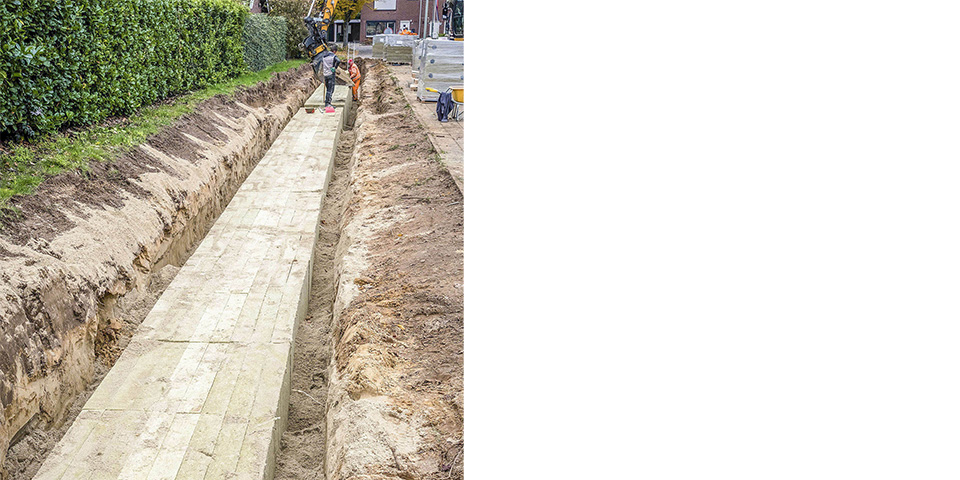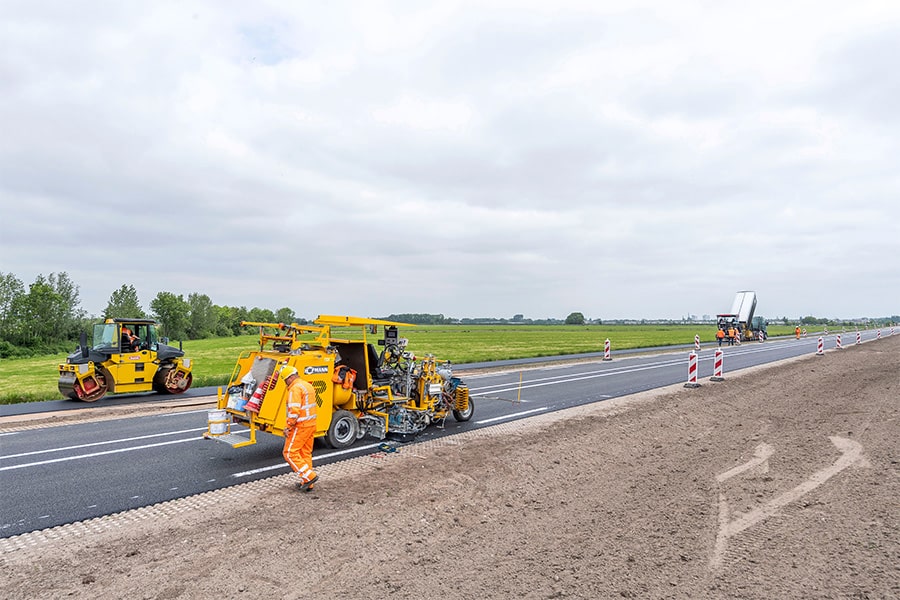
Rockwool Lapinus (part of Rockwool Group) filters more than 50% contaminated microparticles from stormwater runoff along roads
Heavier rainfall and increased desiccation of areas in the Netherlands have a significant impact on the condition of surface water and groundwater. Rainwater that washes into the roadside along through roads and local roads contains concentrations of pollutants originating from vehicles. Lapinus (part of the Rockwool Group) has discovered that stone wool is an excellent material for filtering these kinds of substances from rainwater to prevent them from entering the environment. Wageningen University & Research (WUR) tested the stone wool in their laboratory, with the result that more than 50% of these substances are captured by the stone wool.
Stone wool is used in water management systems (Rockflow) to buffer water with the aim of preventing flooding during heavy rainfall, among other things. At peak loads, excess water is quickly and efficiently captured and slowly infiltrated to groundwater. Lapinus has discovered that the rock wool in these water management systems is also suitable for filtering rainwater. Daan de Kubber, manager of marketing & business development at Lapinus, explains that stone wool is even capable of removing dissolved pollutants from rainwater, such as PAHs and heavy metals like zinc and copper. "These environmentally harmful substances flow into the soil during rainstorms via the asphalt of through roads and local roads. This has far-reaching consequences for water management in the Netherlands, so the substances could also enter the food chain," says De Kubber. PAHs (polycyclic aromatic hydrocarbons) are molecules created by thermal decomposition caused by vehicle exhaust fumes, tires and brakes and are very harmful to health. "Along through roads, very little grows on the roadsides, you find a lot of black goo there. This is heavily contaminated junk that comes off vehicles," De Kubber said. The rock wool in water management systems installed along through roads and local roads is excellent at filtering runoff rainwater. In addition to capturing solid particles, dissolved molecules of PAHs, copper and zinc, can be adsorbed (sorbed) by the stone wool. This prevents these environmentally harmful particles from entering the environment directly. "Stone wool is a sustainable material that can absorb pollution for many years in this way," says De Kubber.

Wageningen University & Research (WUR) began research in 2018 on filtering rainwater and retaining pollutant materials with Lapinus stone wool. Wim Beltman is a scientific researcher in environmental chemistry at Wageningen Environmental Research at WUR. Together with his research team, he studies organic contaminants such as pharmaceuticals and pesticides in the environment and what risks they pose to ecosystems. "In this research, the focus is on the adsorption of PAHs, copper and zinc to rock wool," he said. This fall this research will be published, which was commissioned by Lapinus," Beltman said. Stone wool is already being used to absorb peaks from showers. "We investigated whether PAHs, zinc and copper stick to the stone wool." The tests with artificial wastewater in a laboratory setup show that the substances acenaphtene, phenanthrene (both PAHs), zinc and copper adsorb to the rockwool. The rock wool, or Rockflow WM2005 water absorption system, was found to effectively retain substances in the test: 62% acenaphtene, 91% phenanthrene, 88% copper and 51% zinc.
"We tested rainwater under optimal conditions," Beltman says. "A next step may be to translate our tests to the dynamics of rainwater, how hard it flows, for example, and be able to better approximate field water, which has a different composition than the test water (particles and dissolved organic matter)." Beltman explains that the condition of the stormwater depends heavily on the dynamics of rainfall events. The 2
best to test stormwater regularly at outdoor locations. "Metals like copper and zinc can occur in different forms depending on the acidity and presence of dissolved substances in the water. That has implications for how much of the PAHs, copper and zinc substances adsorb to the rockwool," Beltman says.
Ronald Wentink is senior advisor on water and climate at Syntraal, part of consulting and engineering firm Tauw. He explains how important a good condition of rainwater, surface water and groundwater is for the Netherlands. "If pollution gets into groundwater via rainwater, it can then get into surface water as well," Wentink says. Groundwater flows under the Netherlands to the sea. Pollution moves with the groundwater. "This affects the ecosystem and potentially ends up in our drinking water and food." According to Wentink, filtering polluted rainwater has far-reaching positive effects for the water balance. Indeed, for years the trend has been to infiltrate rainwater into the soil instead of discharging it through the sewer system to treatment. One concern here is polluted rainwater that often still goes through the sewer system to treatment. "Runoff rainwater can sometimes contain high concentrations of PAHs and heavy metals and you don't really want that in the soil directly." If this can be filtered effectively, it means more water can be put into the soil. In doing so, we relieve the burden on the sewer system and build up a water buffer in the soil for drier periods. A hot topic, given the periods of drought and heavy rainfall that the Netherlands is increasingly facing. "In the Netherlands, regulations are limited around filtering rainwater. Denmark, meanwhile, has a law prohibiting infiltration of untreated water from roads. This is because drinking water is extracted from groundwater there and must therefore remain pure. "In the Netherlands, there is still no general law prohibiting untreated rainwater contaminated with PAHs and heavy metals from disappearing into the soil. However, there are requirements for groundwater protection areas," says Wentink. Not only the government but also road authorities and infrastructure companies have an important role to play in preventing infiltration of polluted rainwater into the soil. "Relevant points of interest that the Netherlands should not take lightly," concludes Wentink.



